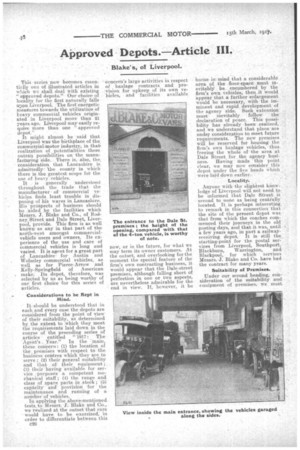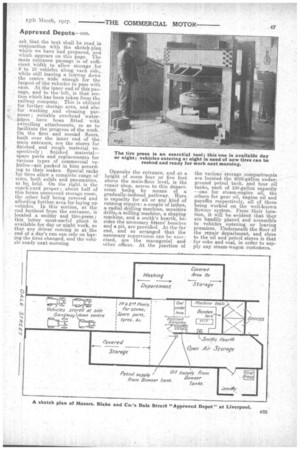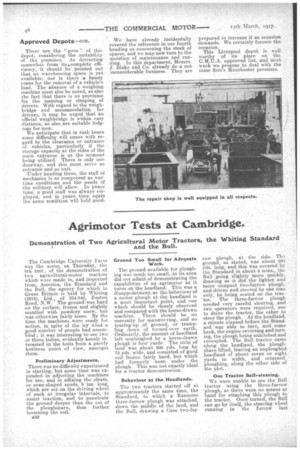Approved Depots. Article III.
Page 4

Page 5

Page 6

If you've noticed an error in this article please click here to report it so we can fix it.
Blake's, of Liverpool.
This •series now becomes essentislly one of illustrated articles in which we shall. deal with existing . " atiproved depots." Our choice of locality for the first naturally falls upon Liverpool. The first energetic. measures towards the utilization of heavy commercial vehicles originated in Liverpool more than 21 years ago. Liverpool may easily require Morethan one " approved depot."
It might almost be -said that Liverpool Was the birthplace of the commernialsmotor industry, in that; realization of potentialities there outran possibilities on -the manufacturing "side. There is, also, the. consideration that Lancashire is adraittecllythe County in which there is .the greatest scope for the use of heavy vehicles. It is generally understood throughout the trade that the manufacturer of commercial vehicles finds, least trouble in disposing of his wares in Lancashire. His 'proSpects of business should be aided by the facilities which Messrs. j. Blake and Co., of Rodney.Street and Dale Street, Liverpool, provide. This firm is as well known as any in that part of the north-west amongst commercialvehicle users and owners. Its experience of the use and care of commercial vehicles is long and varied. It is agent for a great part of Lancashirefor Austin and Wolseley commercial vehicles, as well as for Pierce-Arrow and Kelly-Springfield of American make: Its depot, therefore, was selected by us as being worthy of our first choice for this series of articles.
Considerations to be Kept in Mind. •
It. should be understood that in each, and every case the depots are considered from the point of view of their suitability, as determined by. the extent to .which they meet i
the requirements laid down n the course of the preceding series of
articles entitled " 1917: The. Agent's . Year." In the 'main, these concern: (1) the location of the premises with respect to the business centres which, they are to serve ; (2) their general suitability and that of their equipment ; (3) their having available for service purposes a competent mechanical staff ; (4) the range and class of .spare parts in stock ; (5) capacityand provision' for the maintenance and running of a• nuinb.er of vehicles. In applying the above-mentioned tests, to Messrs. J; Blake and Co., we realized at the outset that care . would have to be exercised, in order to differentiate between this c26 concern's large activities in respect of haulage contracts and pro.;vision, for upkeep of its own vehicles, ahd facilities available
now, or in the future, for what we may term its owner customers. At the outset, and overlooking for the moment the special feature of the firm's own contracting business, it would appear that the Dale-street premises, although falling short of perfection in one or two aspects, are nevertheless admirable for the end in view. If, however, it be
borne inmind that a considerable area of the floor-spacemust inevitably' be. encumbered by the firm's own vehicles, then it would 'appear that a further enlargement would be necessary, with the imminent and rapid development of the agency side. Such extension must inevitably follow the declaration of peace. This possibility has already been realized, and we understand that plans are under consideration to• meet future requirements. The new premises will be reserved for housing 'the firm's own haulage vehicles, thus freeing the whole of. the area at Dale Street for the agency business. Having made this point, clear, we may now consider: this depot under the five heads which were laid down earlier.•
Locality:
Anyone with the slightest knowledge of Liverpool will not need. to., be informed that Dale Street is second to none as being centrally located. It is perhaps interesting,. to remark in this connection 'that. the site of the present depot was that from which the coaches commenced. their journeys in the old posting days, and that it was, until a few years ago, in part a railwayreceiving depot. It is still the starting-point for the postal services from Liverpool, Southport, Blackburn, Warrington, and Blackpool, for which services beressrs. J. Blake and Co. have had the contract for many years.
Suitability of Premises.
Under our second heading, consideration of the suitability and. couipment of premises, we must
ask that the text shall be read in conjunction with the sketch-plan which we have had prepared, and which appears on this page. The main entrance pa i
Ssage s of sufficient. width to allow storage for 8' to 10 vehicles along each Side, while still leaving a fairway down the centre Wide enough for the largest of 'the vehicles to pass with ease. At the inner end of this pas-sage, and to the 'left, is that section which has been taken from the railway company. This is utilized for further storage area, and alsr. for . washing and cleaning purposes; suitable overhead waterpipes have been fitted with swivelling attachments, so as to facilitate the progress of -the work. On the first and second floors, built over the inner end of the main entrance, are the stores for finished and rough. material respectively; finished material—. spare parts and replacements for various types of commercial vehicles—are packed in bins accord7 ing to their makes. Special racks for tires allow a complete range of siZes, both solids and pneumatics, to be. held. On the right is the coach-yard proper; • about half of this forms uncovered storage room, the .other half being covered and affording further area for laying up vehicles. In this section, at the end furthest from the entrance, is located a smithy and tire-press ; this latter most'useful plant is available for day or night work, so that any driver coming in at the end of a day's run can rely on having the tires changed, and the vehicle ready next morning.
Opposite the entrance, and at a height of some four or five feet above the main-floor level, is the repair shop, access to this department being by means of a gradually-inclined pathway. Here is capacity for all or any kind of running repairs a couple of lathes, a radial drilling machine, sensitive drills,a milling machine, a shaping machine, and a smith's hearth, besides the necessary fitters' benches and a pit, are provided. At the far end, and so arranged that the necessary supervision can be exereked, are the managerial and other offices. At the junction of the various storage compartments are located the 2000-gallon underground petrol tank, and four .oil tanks, each of 100-gallon capacity —one for steam-engine oil, the others for gear oil, engine oil and paraffin respectively, all of these being worked on the well-known Bowser system. From their location, it will be evident that they are handily placed and accessible to vehicles entering or leaving premises. Underneath the floor of the repair department, and close to the oil and petrol stores is that for coke and coal, in order to supply any steam-wagon customers.
These are the " pros 7? of this depot, considering the suitability • of the premises. As detracting somewhat from its e complete efficiency, it should be pointed out that no warehousing space is yet available, nor is there a handy crane for the removal of a. vehicle's load. The absence of a weighing machine must also be noted, as also the fact that there is no prOvision for the messing or sleeping of drivers. With regard to the weighbridge and accommodation far drivers, it may be urged that an official weighbridge is within easy distance, as also are suitable lodgings for men.
We anticipate that in rush hours sonic difficulty will ensue with regard to the clearance or entrance of vehicles, particularly if the storage capacity at the sides of the main entrance is at the moment being utilized. There is only one doorway, and this .must serve as entrance and as exit.
Under heading three, the staff of mechanics is as competent as wartime conditions and the needs of the military will .allow. In peace time, a •good staff was always employed, • and in peace time again the same condition will hold good. We have already incidentally covered the reference in our fourth heading as concerning the stock of spares, and we may now turn to the question of maintenance and running. In this department, Messrs. J. Blake and Co. already do a not inconsiderable business. They are prepared to increase it as occasion demands. We certainly foresee the occasion.
This Liverpool depot is well worthy of its place on the C.M.U.A. approved list, and next Week we propose to deal with the same firms Manchester premises.






















